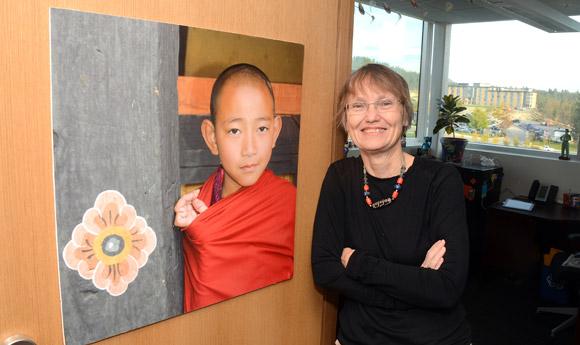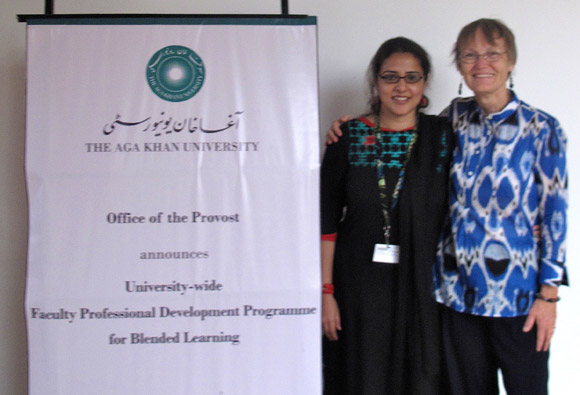
Susan Crichton, associate professor and director of graduate studies with the Faculty of Education at the University of British Columbia’s Okanagan campus in her office after recently returning from Karachi, Pakistan where she co-facilitated a professional development program.
Susan Crichton helping teach faculty in Pakistan
The challenge faced by Aga Khan University (AKU) is a big one. It has to reach people in some of the most geographically hard-to-access places on the planet and Susan Crichton travelled half-way around the world to help meet that challenge by co-facilitating a professional development program.
The associate professor and director of graduate studies with the Faculty of Education at the University of British Columbia’s Okanagan campus was invited by the Karachi-based university to work with 15 faculty from five campuses on two continents to develop a blended learning program that combines face-to-face instruction with online learning.
In areas like Pakistan, Afghanistan and parts of East Africa where AKU operates, both types of teaching can be a difficult endeavor, so Crichton helped faculty determine what methods would best serve their learners.
“These learners may not have electricity, or they may not be able to go to school all of the time so blended learning is a great way to teach them,” says Crichton, who recently returned from a two-week stint in Pakistan.
"The pleasure of working with them (AKU) is you know they are willing to support these learners," she says. "They are offering the best they can at a high standard to people who need it the most."
For many people in North America, a tablet hand-held computer is a handy electronic item to store school work, pictures, music and even play games on, but for people living in geographically, politically and even gender-challenging areas, the devices are vital to receiving an education.
Crichton says the tablets, which can run on solar power, are used to create “off-line learning experiences” and allows the learner to see and hear their lessons no matter where they are.
“These simple tablet devices let people self study,” she says. “It’s really going to make a big difference for both the instructor and the learners.”
But behind each lesson is an instructor, and the 15 AKU faculty will spend the next eight months working online with Canadian mentors -- two of whom are Philip Balcaen and Scott Douglas, faculty members at UBC's Okanagan campus – to develop the blended programs that will then be taken to the learners.
Crichton says it is important to prepare the AKU faculty members because what they learn and how they learn will be a model for future instructors. The plan is for the Canadian mentors to hand over their roles to the AKU faculty, who will then train their own colleagues.

Susan Crichton, associate professor and director of graduate studies with the Faculty of Education at the University of British Columbia’s Okanagan campus, poses for a picture while in Karachi, Pakistan, where she co-facilitated a professional development program.
-- 30 --
 Midway transformer fire
Midway transformer fire Oil company fined
Oil company fined Strata smoking fines tossed
Strata smoking fines tossed UN workers charged
UN workers charged  Trudeau in Saskatoon
Trudeau in Saskatoon  Doctors protest tax change
Doctors protest tax change $620 million for Ukraine
$620 million for Ukraine  5 die crossing channel
5 die crossing channel Jury finds railway at fault
Jury finds railway at fault  Tourism operators struggle
Tourism operators struggle  Nude Beverages sells line
Nude Beverages sells line Wealth gap widening
Wealth gap widening Leafs even series
Leafs even series Cristall gets pro look
Cristall gets pro look Warriors even series in OT
Warriors even series in OT Hozier surprised by #1
Hozier surprised by #1 Trainor to replace Perry?
Trainor to replace Perry? Swift breaks Spotify record
Swift breaks Spotify record



